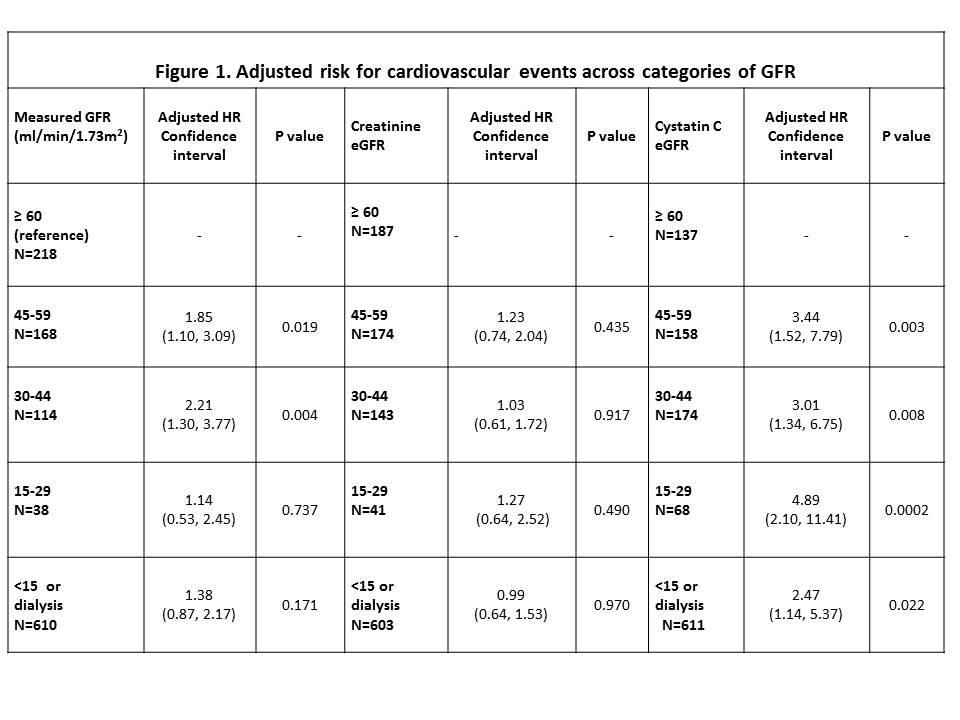Glomerular Filtration Rate Based on Cystatin C Provides the Best Prediction of Cardiovascular Events and Mortality Compared to Measured GFR and Creatinine Based GFR in Kidney Transplant Recipients
L. Galapia1, J. Lieske2, A. Rule2, H. Amer2, N. Zhang1, D. Butterfield1, M. Keddis1
1Mayo Clinic, Scottsdale, AZ, 2Mayo Clinic, Rochester, MN
Meeting: 2020 American Transplant Congress
Abstract number: 345
Keywords: Glomerular filtration rate (GFR), Kidney transplantation, Mortality, Vascular disease
Session Information
Session Name: Kidney: Cardiovascular and Metabolic Complications II
Session Type: Oral Abstract Session
Date: Saturday, May 30, 2020
Session Time: 3:15pm-4:45pm
 Presentation Time: 4:03pm-4:15pm
Presentation Time: 4:03pm-4:15pm
Location: Virtual
*Purpose: GFR estimated by cystatin C (CysC) is a better predictor of cardiovascular (CV) events and mortality compared to eGFR by creatinine (Cr) in native kidney cohorts. In kidney transplant (KTx) recipients, several CV risk factors are non-GFR determinants of CysC. The objective of this study is to compare the association of CysC and Cr eGFR compared to measured GFR (mGFR) with CV events and mortality in a stable cohort more than 1 year post KTx.
*Methods: Simultaneous mGFR (by iothalamate) and Cr and CysC were measured on 1148 adult KTx recipients between 2011-2013 and used to calculate eGFR using the CKD EPI equations. Measured outcomes included CV events (defined as: myocardial infarction, heart failure, cardiac arrest requiring resuscitation, stroke, or peripheral vascular disease requiring intervention), graft failure (defined as: return to dialysis or relisting for KTx), and all-cause mortality.
*Results: Mean age was 56.0 years (SD 14.2), 500 (43.6%) were female, 403 (35.1%) had diabetes (DM), 1083 (94.3%) had hypertension, 127 (11.1%) had prior history of CV events, 602 (52.5%) required dialysis, and 867 (75.5%) received living donor KTx. After a median follow-up of 74 months there were 229 (19.9%) deaths, 176 (14.5%) CV events, and 203 (17.6%) graft failures. Multivariate analysis revealed the following independent predictors of CV events: older age, prior history of CV event, diabetes, smoking, hypoalbuminemia and elevated post-KTx cardiac troponin T with a c-statistic of 0.788. Adjusted hazard ratio (HR) for CysC eGFR per unit decrease was significantly associated with increased CV events (p=0.007) and mortality (p=0.001) while Cr eGFR did not associate with either (p=0.340 and p=0.052 respectively). Figure 1 depicts adjusted HR and confidence intervals for categories of GFR and CV events. mGFR was only associated with CV events for GFR between 30-59ml/min/1.73m2 and there was no association with mGFR and mortality. The most significant mortality risk for CysC eGFR was observed between 15-29ml/min/1.73m2 (HR 4.89 (2.10-11.4), p=0.0002). There was no association of Cr eGFR with CV events or mortality.
*Conclusions: CysC eGFR significantly associates with future risk of CV events across all stages of chronic kidney disease (CKD) and with mortality risk particularly at CKD stage 4 highlighting relationship of CysC with CV disease independent of kidney function. Thus CysC eGFR may be useful to assess CV risk in KTx recipients.
To cite this abstract in AMA style:
Galapia L, Lieske J, Rule A, Amer H, Zhang N, Butterfield D, Keddis M. Glomerular Filtration Rate Based on Cystatin C Provides the Best Prediction of Cardiovascular Events and Mortality Compared to Measured GFR and Creatinine Based GFR in Kidney Transplant Recipients [abstract]. Am J Transplant. 2020; 20 (suppl 3). https://atcmeetingabstracts.com/abstract/glomerular-filtration-rate-based-on-cystatin-c-provides-the-best-prediction-of-cardiovascular-events-and-mortality-compared-to-measured-gfr-and-creatinine-based-gfr-in-kidney-transplant-recipients/. Accessed February 25, 2026.« Back to 2020 American Transplant Congress

